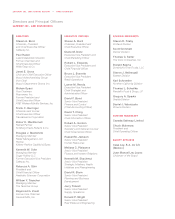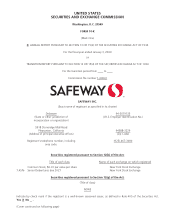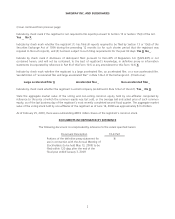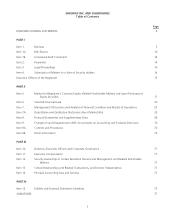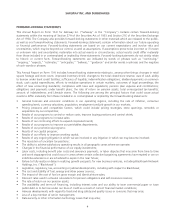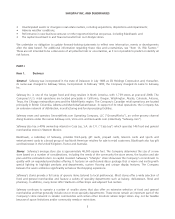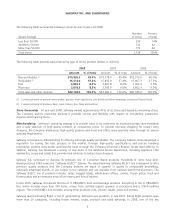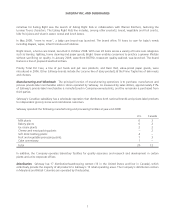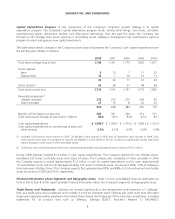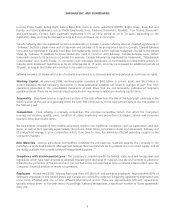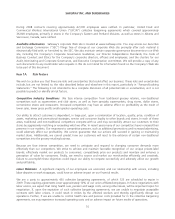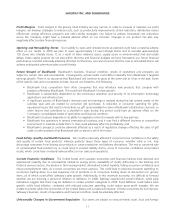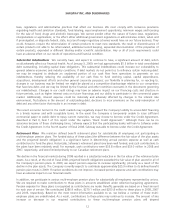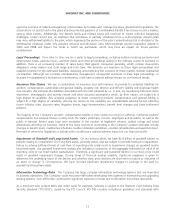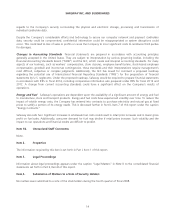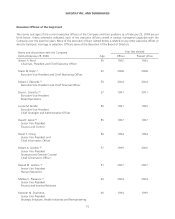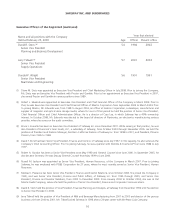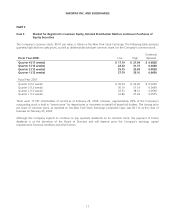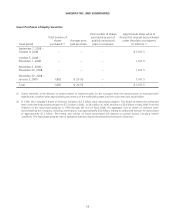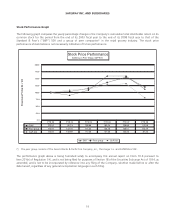Safeway 2008 Annual Report Download - page 29
Download and view the complete annual report
Please find page 29 of the 2008 Safeway annual report below. You can navigate through the pages in the report by either clicking on the pages listed below, or by using the keyword search tool below to find specific information within the annual report.SAFEWAY INC. AND SUBSIDIARIES
Lucerne, Primo Taglio, Eating Right, Eating Right Kids, mom to mom, waterfront BISTRO, Bright Green, Basic Red and
Priority, and other trademarks such as Pak’N Save Foods, Vons, Pavilions, Dominick’s, Randall’s, Tom Thumb, Genuardi’s
and Carrs Quality Centers. Each trademark registration is for an initial period of 10 or 20 years, depending on the
registration date, and may be renewed so long as it is in continued use in commerce.
Canada Safeway also has registered numerous trademarks in Canada. Canada Safeway also has invested significantly in
“Safeway” both as a trade name and a trademark and considers it to be an important asset in Canada. Canada Safeway
owns and has registered in Canada more than 200 trademarks, most of which replicate trademarks owned in the United
States by Safeway. In addition to those trademarks used in common with Safeway, Canada Safeway owns certain
trademarks unique to its business in Canada. For example, Canada Safeway has registered the trademarks, “Macdonalds
Consolidated” and “Family Foods” in connection with wholesale distribution of merchandise to independent grocers. In
Canada, each trademark registration is for an initial period of 15 years, and may be renewed for additional periods of
15 years, as long as the trademark continues to be used in commerce.
Safeway considers its trademarks to be of material importance to its business and actively defends and enforces its rights.
Working Capital At year-end 2008, working capital consisted of $4.0 billion in current assets and $4.5 billion in
current liabilities. Normal operating fluctuations in these substantial balances can result in changes to cash flow from
operations presented in the consolidated statements of cash flows that are not necessarily indicative of long-term
operating trends.There are no unusual industry practices or requirements relating to working capital items.
Seasonality Blackhawk receives a significant portion of the cash inflow from the sale of third-party gift cards late in the
fourth quarter of the year and generally remits the cash, less commissions, to the card partners early in the first quarter of
the following year.
Competition Food retailing is intensely competitive. The principal competitive factors that affect the Company’s
business are location, quality, price, condition of assets, marketing and promotional strategies, service and consumer
loyalty to other brands and stores.
We face intense competition from traditional grocery retailers, non-traditional competitors such as supercenters and club
stores, as well as from specialty supermarkets, drug stores, dollar stores, convenience stores and restaurants. Safeway and
its competitors engage in price competition which, from time to time, has adversely affected operating margins in the
Company’s markets.
Raw Materials Various agricultural commodities constitute the principal raw materials used by the Company in the
manufacture of its food products. Management believes that raw materials for its products are not in short supply, and all
are readily available from a wide variety of independent suppliers.
Compliance with Environmental Laws The Company’s compliance with the federal, state, local and foreign laws and
regulations which have been enacted or adopted regulating the discharge of materials into the environment or otherwise
related to the protection of the environment, has not had and is not expected to have a material adverse effect upon the
Company’s financial position or results of operations.
Employees At year-end 2008, Safeway had more than 197,000 full- and part-time employees. Approximately 80% of
Safeway’s employees in the United States and Canada are covered by collective bargaining agreements negotiated with
union locals affiliated with one of nine different international unions. There are approximately 430 such agreements,
typically having three- to five-year terms. Accordingly, Safeway renegotiates a significant number of these agreements
every year.
9



